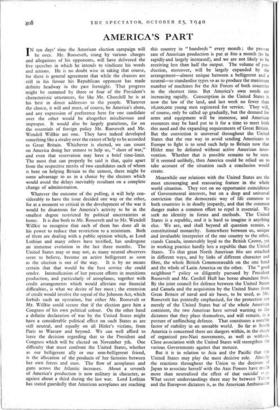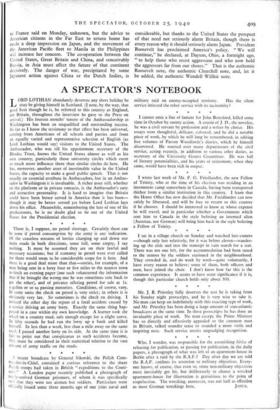AMERICA'S PART
I N ten days' time the American election campaign will be over. Mr. Roosevelt, stung by various charges and allegations of his opponents, will have delivered the five speeches in which he intends to vindicate his words and actions. He is no doubt wise in taking that course, for there is general agreement that while the chances are still in his favour his Republican opponent has made definite headway in the past fortnight. That progress might be stemmed by three or four of the President's characteristic utterances, for like Mr. Churchill he is at his best in direct addresses to the people. Whatever the choice, it will and must, of course, be America's alone, and any expression of preference here for one candidate over the other would be altogether mischievous and improper. It would also be largely gratuitous, for on the essentials of foreign policy Mr. Roosevelt and Mr. Wendell Willkie are one. They have indeed developed something like a rivalry over the extent of help to be accorded to Great Britain. Whichever is elected, we can count on America doing her utmost to help us, "short of war," and even that reservation may have a brief time-limit. The most that can properly be said is that, quite apart from the respective merits of two candidates each of whom is bent on helping Britain to the utmost, there might be some advantage to us in a choice by the electors which would avoid the delays inevitably resultant on a complete change of administration.
Whatever the outcome of the polling, it will help con- siderably to have the issue decided one way or the other, for at a moment so critical in the development of the war it would be disastrous for America's activity to be in the smallest degree restricted by political uncertainties at home. It is due both to Mr. Roosevelt and to Mr. Wendell Willkie to recognise that each of them has done all in his power to reduce that restriction to a minimum. Both of them are dealing with a public opinion which, as Lord Lothian and many others have testified, has undergone an immense evolution in the last three months. The United States may or may not, as many neutral observers seem to believe, become an active belligerent as *soon as the election is out of the way. It is by no means certain that that would be the best service she could render. Intensification of her present efforts in munitions production, and particularly of aeroplanes, together with credit arrangements which would alleviate our financial difficulties, is what we desire of her most ; the extension of credit would involve the repeal of the Johnson Act, which forbids such an operation, but either Mr. Roosevelt or Mr. Willkie could secure that if the election gave him a Congress of his own political colour. On the other hand a definite declaration of war by the United States might have a considerable political effect on such States as are still neutral, and equally on all Hitler's victims, from Paris to Warsaw and beyond. We can well afford to leave the decision regarding that to the President and Congress which will be elected on November 5th. One difficulty that must confront the United States, whether as our belligerent ally or our non-belligerent friend, is the allocation of the products of her factories between her own forces and ours. The flow of aeroplanes and guns across the Atlantic increases. About a seventh of America's production is now military in character, as against about a third during the last war. Lord Lothian has stated guardedly that American aeroplanes are reaching this country in " hundreds " every month ; the present rate of American production is put at 800 a month (to be rapidly and largely increased), and we are not likely to be receiving less than half the output. The volume of pro- duction, moreover, will be largely expanded by the arrangement—almost unique between a belligerent and a neutral—to standardise types so as to produce the maximum number of machines for the Air Forces of both countries in the shortest time: But America's own needs are increasing rapidly. Conscription in the United States is now the law of the land, and last week no fewer than 16,000,000 young men registered for service. They will, of course, only be called up gradually, but the demand for arms and equipment will be immense, and American resources may be hard put to it for a time to meet both this need and the expanding requirements of Great Britain. But the conviction is universal throughout the United States that the one way to avoid sending Americans to Europe to fight is to send such help to Britain now that Hitler may be defeated without active American inter- vention. Whether that is possible remains to be seen. If it seemed unlikely, then America could be relied on to take account of the situation such a conclusion would create.
Meanwhile our relations with the United States are the most encouraging and reassuring feature in the whole world situation. They rest on no opportunist coincidence of Governmental interests, but on a deep and universal conviction that the democratic way of life common to both countries is in deadly jeopardy, and that the common danger makes a common effort to repel it essential. We seek no identity in forms and methods. The United States is a republic, and it is hard to imagine it anything else. We are, and shall beyond all question remain, a constitutional monarchy. Somewhere between us, unique and invaluable interpreter of the one country to the other, stands Canada, immovably loyal to the British Crown, yet in working practice hardly less a republic than the United States. To that great North American bloc are attached in different ways, and by links of different character and fibre, the whole British Commonwealth on the one hand and the whole of Latin America on the other. The "good neighbour" policy so diligently pursued by President Roosevelt and Mr. Cordell Hull has borne abundant fruit. By the joint council for defence between the United States and Canada and the acquisition by the United States from Great Britain of naval and air bases, to be used, as Mr. Roosevelt has pointedly emphasised, for the protection not merely of the United States but of the whole American continent, the two Americas have served warning to the dictators that they place themselves, and will remain, in a posture of unflinching defence. That constitutes a notable factor of stability in an unstable world. So far as South America is concerned there are dangers within, in the shape of organised pro-Nazi movements, as well as ,without. Close association with the United States will strengthen the various Governments against that menace.
But it is in relation to Asia and the Pacific that the United States may play the most decisive role. Already the reactions throughout the Union to, the decision of Japan to associate herself with the Axis Powers have much more than neutralised the effect of that suicidal st.:p. What secret understandings there may be between Tokyo and the European dictators is, as the American Ambassador to France said on Monday, unknown, but the advice to American citizens in the Far East to return home has made a deep impression on Japan, and the movement of the American Pacific fleet to Manila in the Philippines will increase her concern. The co-operation between the United States, Great Britain and China, and conceivably Russia, in Asia must affect the future of that continent decisively. The danger of war, precipitated by some Japanese action against China or the Dutch Indies, is considerable, but thanks to the United States the prospect of that need not seriously alarm Britain, though there is every reason why it should seriously alarm Japan. President Roosevelt has proclaimed America's policy. "We will continue," he declared, at Dayton, Ohio, a fortnight ago, "to help those who resist aggression and who now hold the aggressors far from our shores." That is the authentic Roosevelt note, the authentic Churchill note, and, let it be added, the authentic Wendell Willkie note.



























 Previous page
Previous page